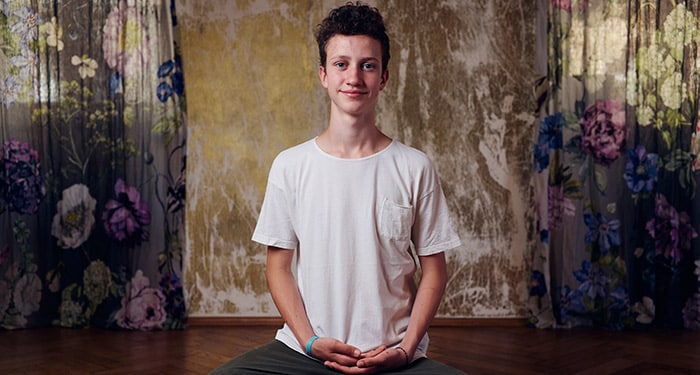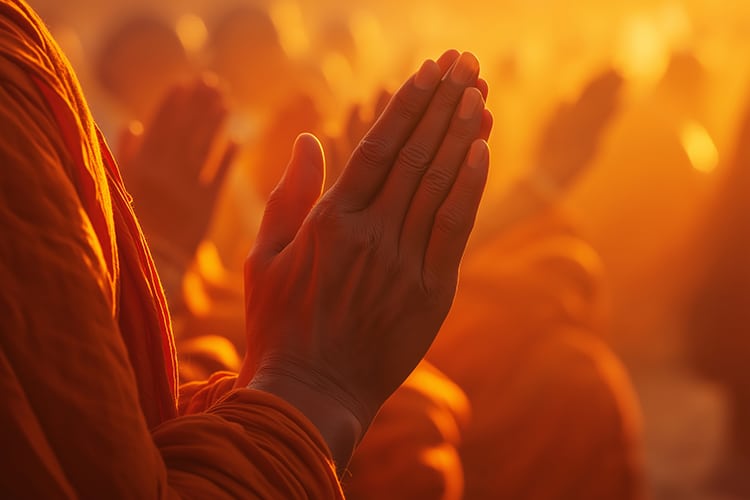Parenting as a Meditator—Is Meditation Important for Families?
Category: Meditation for Students and Families | Mind Trainer Articles

Essential qualities to develop in meditation that help your child grow
It’s not “Either I meditate or I have to be a mum or dad.” Often people think, “I have to be a parent and nothing else,” or “I can’t be a parent because I’ve got other things that are important for me in life.” You’re not a good parent, I think, unless there are other things that are important for you in life. In one way, being a parent is this wonderful gift: you learn to live for another being, and learning that is surely the highest joy in life. But notice: live for and not live through.
Quite often people get this wrong. Often we want too much from our children. Often, all of our own failures or the things we’ve never done and always wanted to do—all the schemes we had for ourselves—are projected onto this little child. We want them to fulfill our dreams for us, we want them to make us complete beings. “I’ve got this wonderful project, this child; he makes me feel complete.” “She’s the purpose of my life.” Listen to that! What are we demanding from this poor child? It’s too much of a burden to put on them. Some people try to live—totally, 100%—through their children. They’re not good parents because they’re demanding too much. A child needs a parent who is a whole being, not a kind of shadow person who’s living only for them.
I think we get it wrong in some ways. We forget that, as parents, in order to be able to give guidance and to help, care for and nourish this young, growing human being, we ourselves have to be complete human beings. Parents, when you live your lives as full people, then you’re the best parents you can be. And so what that means, for instance, is that you should try to preserve your meditation practice. But also be relaxed about the fact that it’s going to be somewhat choppy. At least during the first few years, you’re going to have to put it aside many times and deal with your child’s needs.
It’s okay. The essential qualities you’re developing through these types of meditation practice of attentiveness to life, of care, of spaciousness, of dissolving the tight knots of neuroticism continue, because caring for others helps that process too. So it’s not meditation or being a mum, or meditation or being a dad. It’s meditation and.
If you continue with your meditative practice, you develop a kind of confidence, a trust. You’re able to find your inner strength and inner wealth so that you don’t feel a need to demand from the child the solution to all of your problems. For parents, meditation brings about this sense of inner contentment and confidence and therefore you truly have something to give. You have some wealth and strength to draw on and share with your child.
Another way of mishandling things is, “Okay, no boundaries. I’m just going to go with the flow.
Often in the relationship between parents and children, the parent doesn’t really have that confidence, so they do one of two things. Maybe they’re too strict because they fear any disorder—but the child is a growing being. Of course there’s disorder in that. Of course there’s a little bit of chaos. Of course, there’s a little bit of rule testing from the child. So that’s one extreme: too tight.
Another way of mishandling things is, “Okay, no boundaries. I’m just going to go with the flow. I’m just going to let the child do whatever he or she wants.” The child will not grow up developing a sense of inner strength because to develop that they need to be aware that there are some boundaries.
Now, if we’re neurotic and anxious, we’ll go for one of those two extremes. Too tight or too slack. In fact, we’ll probably veer between them. Sometimes we’ll be over-permissive, sometimes we’ll be over-restrictive. But in meditation we’re working with discomfort. We learn to handle distraction and be okay with it so that we don’t lose the thread: this is a long-term relationship with this child. We need to draw some boundaries, and those boundaries need to be spacious enough for a growing child to be able to find him or herself within them.
We have a responsibility for the next generation here in our children.
Another thing about the neurotic parent is that in a way it’s all about me, me, me. The strict person will be overly concerned with how the child might be embarrassing them. The lax person is also thinking how the child reflects on them, thinking “I’ve got to be a super liberal, super permissive parent.” No, no, we have a duty of care. We have a responsibility for the next generation here in our children. When it’s not all about us, as we discover through practicing, then we can afford to be calm. We can be wise in the choices we make in terms of providing the right balanced environment in which a healthy, self-reliant child can grow—a child who knows their boundaries in society, in their relationships, and one that has enough spaciousness to feel free and creative. This is the best way to teach meditation to our children—by our example of our own practice.
And by the way, we’ll mess up many times. If we’re too anxious and too tight about this whole business, it will destroy us. But meditation is where we’re always renewed. Sure we forget. Sure we become neurotic. Sure we lose it. But when we go back and sit, we’re touching a place that’s beyond our temporary anxieties, beyond our temporary failures. As parents—and as human beings—we draw nourishment from that space where everything is stable, open and relaxed. So yes, meditation for parents? Sure! And why not meditation for students too! We really need it.
Interested in learning how to teach your child to meditate? First you need to practice yourself – learn more about our course Meditation for Parents here! Learn mindful parenting meditation – includes a special meditation for teens.
This is the first article in a series by Lama Jampa Thaye on parenting and meditation. Here are the others:
– Part two continues the discussion with creating space for our children.
– Part three shows how meditation is essential in making better parenting decisions.
– Part four is about information technology, social media and meditation.
Interested in more on students and mindfulness? Check out our blog post on how mindfulness can impact a high school environment.






